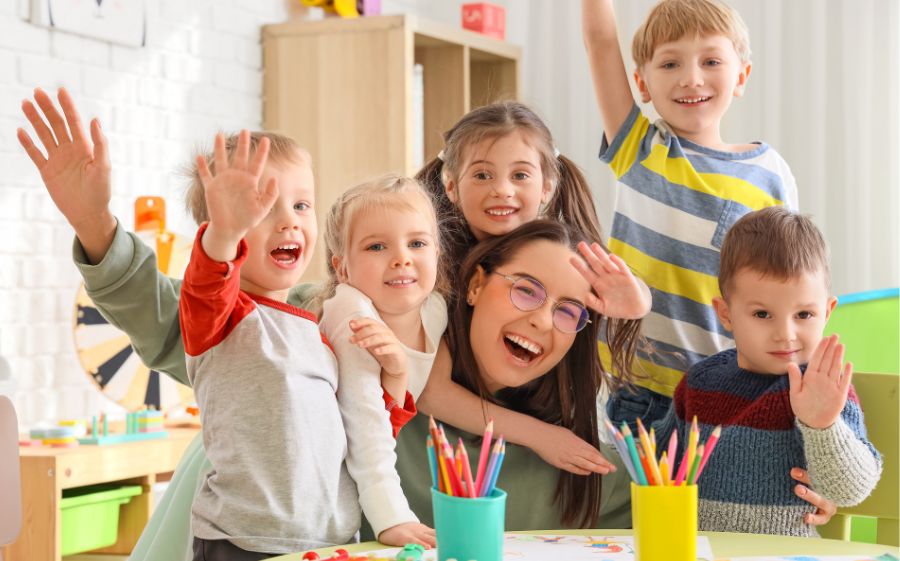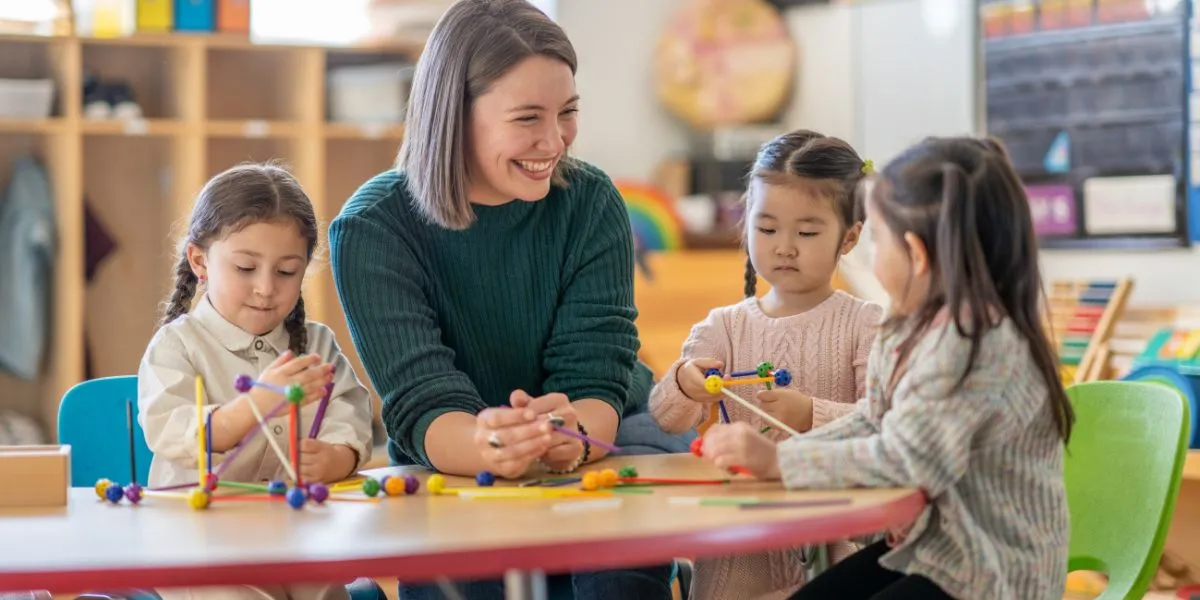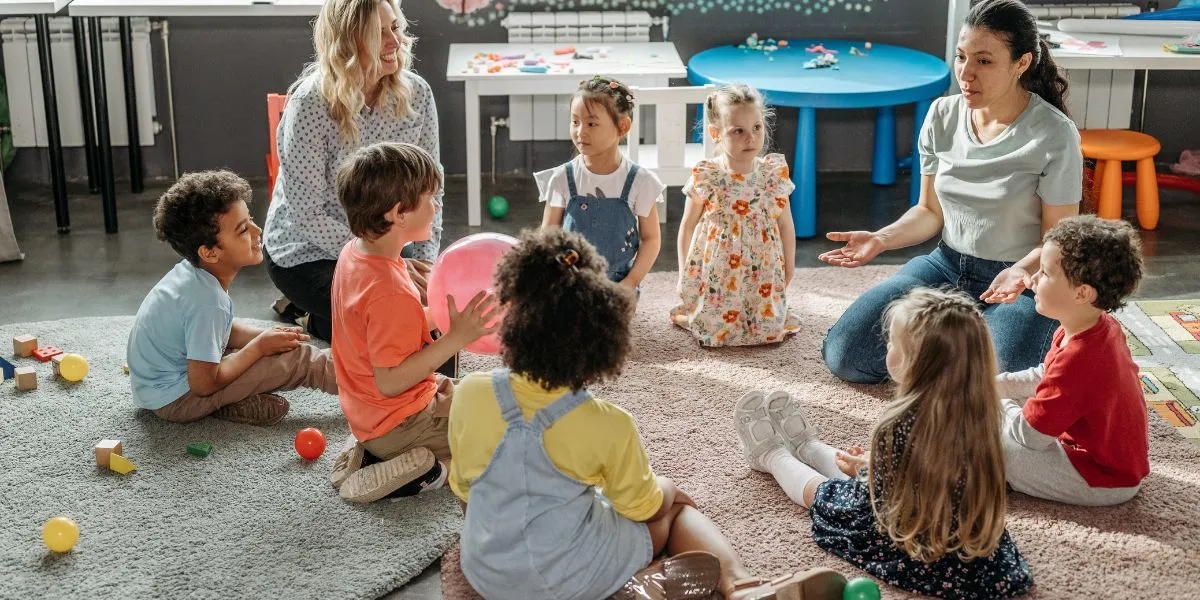
With your child approaching kindergarten age, you might be feeling a mix of excitement and concern about this important milestone. You want to ensure they are ready to thrive in a new environment with at least the basic skills.
What age to start kindergarten varies depending on your child's development and your local school district's specific requirements. Completing a kindergarten readiness checklist can help you identify areas where your child may need additional support before starting.
What Is Kindergarten Readiness?
Kindergarten readiness refers to how prepared your child is to start school and succeed in a kindergarten classroom. It involves a mix of skills and abilities across different areas of development, such as:
- Socializing
- Emotional readiness
- Communication
- Attention
- Behavior
- Independence
Kindergarten readiness lays the foundation for a child's educational journey and overall development. Many parents and caregivers might focus on pre-academic skills like recognizing letters and numbers. However, your kid's social-emotional, language development and self-regulation skills are just as important for this phase of their lives. A positive start in kindergarten can foster a love for learning and boost your child's confidence.
Key Signs Your Child Is Ready for Kindergarten
You'll need to assess a variety of developmental milestones across several areas. This is what your child should know before kindergarten, especially by 5 years old:
- Social and emotional readiness: Your child knows how to play and share with other kids. They show enthusiasm for learning, explore new things and can follow simple instructions. They can self-regulate their emotions and behaviors — like waiting for a turn or asking for help — and separate from their parent or caregiver without distress.
- Ability to communicate: At the age of 5, your kid tells simple stories and answers questions about them. They can have back-and-forth conversations with other children and adults. They can also express their needs and understand simple questions.
- Cognitive development: Kids should be able to pay attention for 5 to 10 minutes during activities like story time. They understand basic concepts of time, like “yesterday" and "tomorrow." They also recognize some letters and numbers.
- Physical abilities: Your child exhibits fine motor skills, like holding a pencil and buttoning clothes, and shows motor coordination, such as hopping on one foot or riding a bike with training wheels.
- Self-help skills: At this age, children should know their full name plus the names of their parents or caregivers. They can perform simple self-help tasks, like wiping their nose or using the toilet, with minimal help.
Every child develops at their own pace, so consider these factors collectively and consult with teachers or pediatricians for more insights.

How Parents and Caregivers Can Support Kindergarten Readiness at Home
Create a nurturing environment that encourages learning and development to help your child get ready for kindergarten. Here are some practical ways:
1. Introduce Them to Reading, Writing, and Math
Reading, writing, and math form the basis of most academic learning. Early exposure will make it easier for your child to grasp more complex concepts later on. Here are some activities to help them develop these foundational skills:
- Read with your child every day to build vocabulary and comprehension.
- Encourage your child to write their name, starting with tracing and gradually moving to freehand writing.
- Incorporate numbers into daily activities, like counting steps, toys or snacks.
- Use alphabet books, puzzles and games to help your child recognize letters and numbers.
- Trace letters or numbers in sand to make learning tactile and enjoyable.
2. Incorporate Skill-Building Activities
Skill-building activities support cognitive, social, emotional and physical development. As children master new skills, they gain confidence and a sense of independence, which encourages them to take on new challenges.
Here's how you can encourage curiosity and gross motor skills:
- Explore new places together and encourage your child to ask questions and seek answers.
- Give your child age-appropriate tasks like sorting out laundry or watering plants.
- Provide opportunities for running, jumping, climbing and playing sports to develop coordination and strength.
- Encourage your kid to dress themselves, brush their teeth and manage personal hygiene with minimal assistance.
3. Promote Independence and Responsibility
Taking responsibility for tasks helps children understand the value of contributing to their family and community. These strategies can help encourage these traits:
- Allow your child to make simple decisions, like choosing their clothes or snacks, to strengthen decision-making skills.
- Encourage your kid to clean up their toys and organize their room.
- Let your child help plan family activities or meals to give them a sense of involvement and ownership.
- If you have pets, let your kid help with feeding to foster empathy and routine.
- When faced with a challenge, guide your child to think through possible solutions and choose the best one.

4. Foster Social and Emotional Skills
Social and emotional skills form the foundation for healthy relationships, effective communication and emotional well-being. They help children build and maintain friendships, work collaboratively and resolve conflicts.
You can support your child's development in the following ways:
- Arrange regular playdates with friends to practice social interaction, sharing and taking turns.
- Use role-playing scenarios to help your kid practice expressing emotions and understanding others' perspectives.
- Enroll your child in group activities like sports, dance or art classes, where they can learn to cooperate and work as part of a team.
- Help your child identify and label their emotions by asking questions like: “How do you feel right now?”, “What made you feel that way?”, “Are you sad, angry, frustrated?", “Could you be hungry, thirsty or tired?”, and "What would help make this better?”
Frequently Asked Questions About Kindergarten Readiness
Here are more tips for getting your kid kindergarten-ready.
1. When Should Your Child Start Kindergarten?
Many kindergarten programs are established for children between 4 and 6 years old, but most kindergartners are 5 when they start the school year. Kids at this age are generally more mature, socially aware and tend to interact well with others. Consider your child's temperament and maturity, especially if they're on the younger or older end of the age range.
2. How Do You Handle Separation Anxiety?
Discuss kindergarten with your child and describe a typical day. Talk about the fun activities and new friends they'll make. If possible, visit the classroom with them before school starts. Seeing the environment and meeting their teacher can reduce anxiety. You can also arrange playdates or enroll them in short classes to help them get used to being apart.
3. When Should You Consider Waiting Another Year?
Some signs your child is not ready for kindergarten include:
- Lack of self-help skills: If your child finds it challenging to use the toilet independently, dress themselves or use utensils, it might be beneficial to delay kindergarten.
- Behavioral concerns: If they have difficulty managing emotions or get into physical altercations with peers, it may be wise to address these issues with a pediatrician before starting school.
- Social and emotional immaturity: Children who are socially immature or have difficulty sitting still and paying attention may benefit from an additional year to develop these skills.
Help Your Child Thrive at the Greater Philadelphia YMCA
If you want to ensure your kid is ready for kindergarten, consider enrolling them in an early learning program. Early learning programs are designed to support kids' development of skills that are important for kindergarten readiness.
At the Greater Philadelphia YMCA, our Early Learning Care programs specifically address kindergarten readiness for children ages 37 months to 5 years. Our curriculum is designed to help your child develop the foundational skills, social-emotional growth and self-care abilities needed for a successful transition to kindergarten. In our preschool programs, we engage children through music, mathematics, and play.
Schedule a tour with a certified Child Care team member.